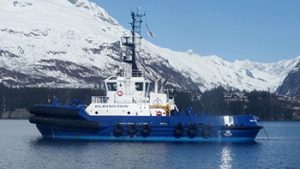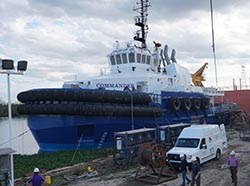
Prince William Sound was a hive of activity this summer. On July 1, Alyeska’s marine services contractor transitioned from Crowley Maritime Corporation to Edison Chouest Offshore.
This transition means all of the escort tugs and much of the spill prevention and response equipment in Prince William Sound are brand new, or new to the Sound.
Demonstrations of the new equipment
The Alaska Department of Environmental Conservation required that each vessel and crew member demonstrate their capabilities before beginning service. Each tug, as well as each tug’s captain, had to perform a set of maneuvers which differed according to the vessel and its purpose.

